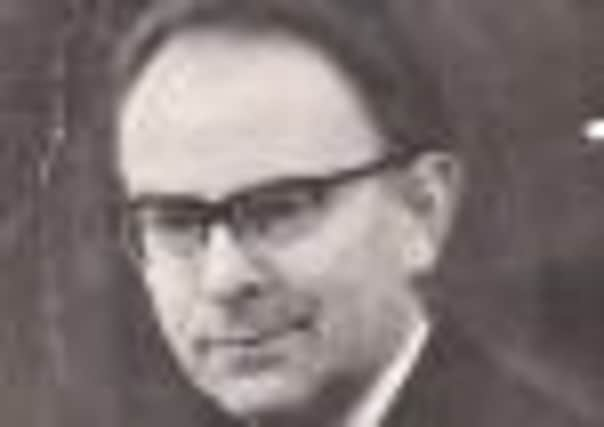Obituary: Peter McEwan, academic, author and art dealer


Peter McEwan was a true Renaissance man, an original thinker with an ability to constantly reinvent himself over an unconventional career that embraced pig farming, academia and art.
It took him from London to Fort Augustus, and from Africa to Harvard and Royal Deeside as he amassed a knowledge of everything from the intricacies of refining horse urine (unfruitful) and ghost-hunting (debatable) to founding an international journal that became a global leader in its field and taking on the art establishment (both hugely successful).
Advertisement
Hide AdAdvertisement
Hide AdCoupled with personal charisma, effortless ability to organise plus a ready sense of humour and insatiable curiosity, he was also a huge asset socially, not least for his positive attitude to life. “I have always found it easier to recall the good things than remember the bad,” he once said, “To recollect the happy events and the good people rather than remember the disappointments and the disagreeable.”
An only child, he was born in London where he was educated at The Hall prep school and then Highgate School, from where he was evacuated during the Second World War to Westward Ho in Devon. He later tried to enlist in the Navy but suffered from bronchial asthma and was turned down on health grounds.
He went up to Edinburgh University where he studied psychology and sociology and was active in student politics, as senior president of the Students’ Representative Council, and co-founded a philosophical society with the philosopher and theologian John Hick. He graduated with an MA in 1949 which he later followed, in the 1960s in Africa, with a PhD.
He married his university sweetheart, Dorothy Turnbull, and taught for a spell at Wood Hall School in Wetherby, Yorkshire before becoming a pig farmer in the Highlands, an area he had fallen in love with as a boy. The couple lived at Ardachie, near Fort Augustus, in the early 1950s where they raised their young family.
There, McEwan looked after large Whites and Wessex Saddlebacks and experimented with refining Shetland pony urine for cosmetics. He also became involved in an attempt to establish if their home was haunted by a tormented former owner. Unexplained happenings and sightings of an elderly woman were investigated by the Society for Psychical Research. No conclusion was apparently reached, but the incidents passed into paranormal lore and later featured in a BBC film of the ghost story.
While living in the Highlands, McEwan also set his sights on becoming a politician and stood as a Liberal candidate in Caithness and Sutherland in the 1951 general election. He didn’t win but he did boost the Liberal vote. However, by the late 1950s, he had left Scotland with his family and embarked on what was to become a hugely influential career in academia.
Initially a research fellow at the Rhodes-Livingstone Institute, in what was then known as Northern Rhodesia, in 1962 he became a visiting professor at the State University of New York and three years later was appointed director of Harvard University’s Family Research Unit. While at Harvard, in 1967, he founded the multi-disciplinary International Journal of Social Science and Medicine, which he went on to edit for 30 years. He returned to the UK later that year to establish the Centre for Social Research at the fledgling Sussex University. The following year, he established and chaired the biennial International Conferences on Medicine and the Social Sciences and, during his time at Sussex, also helped to found its Centre for Medical Research.
His legacy is the understanding he pioneered between the sciences, and his bringing together of different disciplines, particularly through his groundbreaking conferences which introduced a range of experts to each other who may otherwise not have met. Over the years he influenced generations of social scientists, inspiring them with his breadth of vision, seamless multi-tasking and deeply curious intellect.
Advertisement
Hide AdAdvertisement
Hide AdA writer all his life, McEwan’s academic publications include Study of Africa, Readings in African History and Industrial Organizations and Health.
An art dealer and antiquarian bookseller since the early 1970s, he also wrote the definitive Dictionary of Scottish Art and Architecture – a labour of love crafted over 12 years and now widely used by galleries and museums. He also authored Art Words, a handbook of art and art-related terms, plus his autobiography, To Catch The Moon From The Bottom Of The Sea.
He was proprietor of McEwan Fine Books and a partner, with his wife, in the McEwan Gallery specialising in 18th, 19th and 20th century paintings and watercolours, both ventures run from their home at Ballater. The couple once discovered half of a lost Thomas Gainsborough double portrait. Though the art establishment dismissed their claim, they were later vindicated when the painting’s missing piece was identified and the halves reunited. It now hangs in the Gainsborough Museum in Suffolk.
Although ill health had plagued him since childhood, it failed to dent his enthusiasm for a range of other pursuits, including golf, cricket and chess. Known for his gamesmanship, he co-founded West Aberdeenshire Golfing Society and was its honorary life president. He ran the local Bridge League with characteristic humour and had captained Crathie Cricket Club, of which he was life vice president and archivist.
He described himself as an incurable romantic. Others saw him as a gentleman and a genuine polymath – unorthodox, never dull and impossible to pigeon-hole. He is survived by his wife Dorothy, children Feona, Malcolm and Rhod, and grandsons Stuart and Andrew.